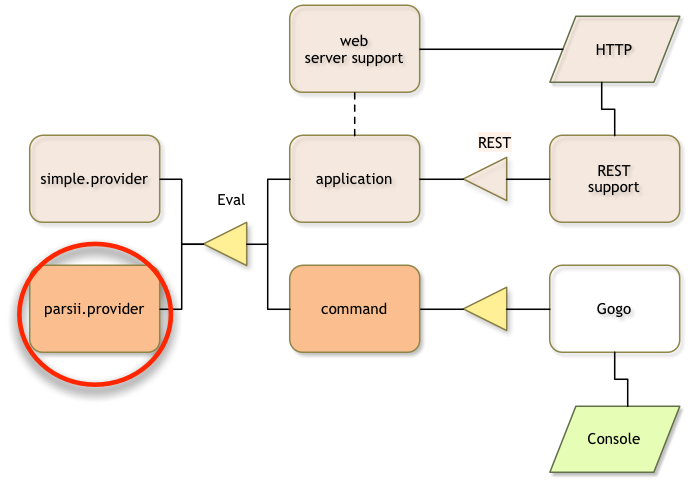Dependencies
What You Will Learn in this Section
In this section we will replace the rather simplistic parser with an external dependency from Maven Central. This dependency is Parsii, a very lightweight expression parser.

Make sure you are in the top directory:
$ cd ~/workspaces/osgi.enroute.examples.eval
Create Project
Create a new project for the osgi.enroute.examples.parsii.provider in the parsii.provider
directory of the osgi.enroute.examples.eval directory. The pom.xml file should look like:
osgi.enroute.examples.eval $ mkdir parsii.provider
osgi.enroute.examples.eval $ cd parsii.provider
parsii.provider $ vi pom.xml
// add following pom
<project
xmlns="http://maven.apache.org/POM/4.0.0"
xmlns:xsi="http://www.w3.org/2001/XMLSchema-instance"
xsi:schemaLocation="http://maven.apache.org/POM/4.0.0 http://maven.apache.org/xsd/maven-4.0.0.xsd"
>
<modelVersion>4.0.0</modelVersion>
<parent>
<groupId>org.osgi</groupId>
<artifactId>osgi.enroute.examples.eval</artifactId>
<version>1.0.0-SNAPSHOT</version>
</parent>
<artifactId>osgi.enroute.examples.eval.parsii.provider</artifactId>
<description>Eval Provider based on Parsii library</description>
<dependencies>
<dependency>
<groupId>com.scireum</groupId>
<artifactId>parsii</artifactId>
<version>2.3</version>
</dependency>
<dependency>
<groupId>org.osgi</groupId>
<artifactId>osgi.enroute.examples.eval.api</artifactId>
<version>1.0.0-SNAPSHOT</version>
</dependency>
</dependencies>
</project>
This is quite similar to the simple provider that we had earlier but now with an extra dependency for the Parsii parser.
Source Code
We can use the following source code:
parsii.provider $ mkdir -p src/main/java/osgi/enroute/examples/eval/parsii/provider
parsii.provider $ vi src/main/java/osgi/enroute/examples/eval/parsii/provider/EvalImpl.java
// Add the following code
package osgi.enroute.examples.eval.parsii.provider;
import org.osgi.service.component.annotations.Component;
import org.osgi.service.component.annotations.Reference;
import org.osgi.service.log.LogService;
import osgi.enroute.examples.eval.api.Eval;
import parsii.eval.Parser;
@Component(name = "osgi.enroute.examples.eval.parsii.provider")
public class EvalImpl implements Eval {
@Reference
LogService log;
@Override
public double eval(String expression) throws Exception {
return Parser.parse(expression).evaluate();
}
}
The reference to the log service is not used. This line was added to solve
a bug in bnd that should soon be solved. The problem was that for a very simple
DS use no osgi.extender requirement is included.
Bundle Layout
The bnd.bnd file is a bit more complex than the simple provider we made before. The reason is that the dependency we added is not a bundle, we can therefore not depend on this JAR in the runtime. In these cases, there are two different tracks to take. You can either wrap this bundle or include it. Wrapping a bundle means creating a new project and providing the OSGi metadata. Including the JAR means including the required packages from the JAR with bnd’s Private-Package instruction.
In this example we’ve selected the including strategy. The bnd.bnd file therefore looks as follows:
parsii.provider $ vi bnd.bnd
// add the following bnd.bnd
Export-Package: osgi.enroute.examples.eval.api
Private-Package: \
parsii.*, \
osgi.enroute.examples.eval.parsii.provider
Just like the simple provider, we’ve exported the API. However, where we’ve used the default of all classes from the project for the simple provider, here we explicitly list the packages that we want included.
Maven does not clean the classes directory for a build automatically. This means
that only after a mvn clean can you be assured of the right content. In practice,
it is easy to end up with classes from long gone experiments with the bnd.bnd file.
Building
Again, don’t forget to add the parsii.provider module to the parent pom.
We now build the bundle:
parsii.provider $ mvn install
...
parsii.provider $ bnd print target/osgi.enroute.examples.eval.parsii.provider-1.0.0-SNAPSHOT.jar
[MANIFEST osgi.enroute.examples.eval.parsii.provider-1.0.0-SNAPSHOT]
Bnd-LastModified 1475601027531
Build-Jdk 1.8.0_25
Built-By aqute
Bundle-ManifestVersion 2
Bundle-Name osgi.enroute.examples.eval.parsii.provider
Bundle-SymbolicName osgi.enroute.examples.eval.parsii.provider
Bundle-Version 1.0.0.201610041710
Created-By 1.8.0_25 (Oracle Corporation)
Export-Package osgi.enroute.examples.eval.api;version="1.0.0"
Import-Package osgi.enroute.examples.eval.api;version="[1.0,1.1)"
Manifest-Version 1.0
Private-Package parsii.tokenizer,parsii.eval,osgi.enroute.examples.eval.parsii.provider
Provide-Capability osgi.service;objectClass:List<String>="osgi.enroute.examples.eval.api.Eval"
Require-Capability osgi.ee;filter:="(&(osgi.ee=JavaSE)(version=1.8))"
Service-Component OSGI-INF/osgi.enroute.examples.eval.parsii.provider.xml
Tool Bnd-7.0.0
[IMPEXP]
Import-Package
osgi.enroute.examples.eval.api {version=[1.0,1.1)}
Export-Package
osgi.enroute.examples.eval.api {version=1.0.0, imported-as=[1.0,1.1)}
The Private-Package header added by bnd clearly shows that we’ve added the parsii packages that it found in the bundle. We specified a wild card in the bnd.bnd file for Private-Package but in the manifest we can clearly see that there are parsii.tokenizer and parsii.eval packages on the classpath.
Running It
We should now switch to the bndrun project.
parsii.provider $ cd ../bndrun
parsii.provider $ vi pom.xml
// replace dependencies with next section
We first need to replace the simple provider with our newly eval parser in the pom.xml in this project so it can be used by the resolver. The dependencies should therefore look like:
<dependencies>
<dependency>
<groupId>org.osgi</groupId>
<artifactId>osgi.enroute.examples.eval.parsii.provider</artifactId>
<version>1.0.0-SNAPSHOT</version>
</dependency>
<dependency>
<groupId>org.apache.felix</groupId>
<artifactId>org.apache.felix.gogo.shell</artifactId>
<version>1.0.0</version>
</dependency>
<dependency>
<groupId>org.osgi</groupId>
<artifactId>osgi.enroute.examples.eval.command</artifactId>
<version>1.0.0-SNAPSHOT</version>
</dependency>
<dependency>
<groupId>org.osgi</groupId>
<artifactId>osgi.enroute.pom.distro</artifactId>
<version>2.0.0</version>
</dependency>
</dependencies>
In the bndrun project in the osgi.enroute.examples.eval.bndrun file, we need to
change the -runrequires to use the parsii.provider instead of the simple provider:
parsii.provider $ cd ../bndrun
bndrun $ vi osgi.enroute.examples.eval.bndrun
// Replace the -runrequires
-runrequires: \
osgi.identity;filter:='(osgi.identity=org.apache.felix.gogo.shell)',\
osgi.identity;filter:='(osgi.identity=org.apache.felix.gogo.command)',\
osgi.identity;filter:='(osgi.identity=osgi.enroute.examples.eval.command)',\
osgi.identity;filter:='(osgi.identity=osgi.enroute.examples.eval.parsii.provider)'
Then resolve, which should give something like:
bndrun $ mvn install
...
-runbundles: \
org.apache.felix.configadmin; version='[1.8.8,1.8.9)',\
org.apache.felix.gogo.command; version='[0.16.0,0.16.1)',\
org.apache.felix.gogo.runtime; version='[0.16.2,0.16.3)',\
org.apache.felix.log; version='[1.0.1,1.0.2)',\
org.apache.felix.scr; version='[2.0.2,2.0.3)',\
org.eclipse.equinox.metatype; version='[1.4.100,1.4.101)',\
org.osgi.service.metatype; version='[1.3.0,1.3.1)',\
osgi.enroute.examples.eval.command; version='[1.0.0,1.0.1)',\
osgi.enroute.examples.eval.parsii.provider; version='[1.0.0,1.0.1)',\
org.apache.felix.gogo.shell; version='[2.0.0,2.0.1)'
...
And then update the osgi.enroute.examples.eval.bndrun file with the returned -runbundles and run mvn install again.
We can then run the application:
bndrun $ java -jar osgi.enroute.examples.eval.jar
____ _
___ _ __ | _ \ ___ _ _| |_ ___
/ _ \ '_ \| |_) / _ \| | | | __/ _ \
| __/ | | | _ < (_) | |_| | |_ __/
\___|_| |_|_| \_\___/ \__,_|\__\___|
https://v2archive.enroute.osgi.org
G! eval sin(pi)
1.2246467991473532E-16
G! eval cos(pi)
-1.0
G!
What did We Learn in this Section?
We created a new provider that used an external dependency. We needed to include the code from this dependency inside our new bundle because the Parsii JAR does not contain any OSGi metadata.
We then added this new project to the modules and updated the bndrun project to use the new Parsii provider.
And it worked!
Prev Next